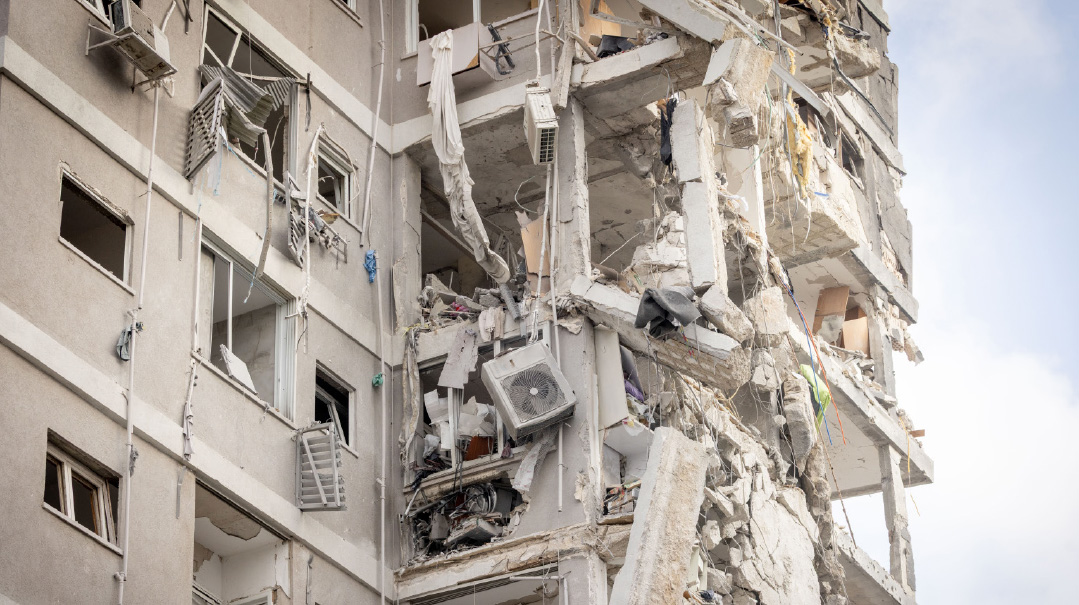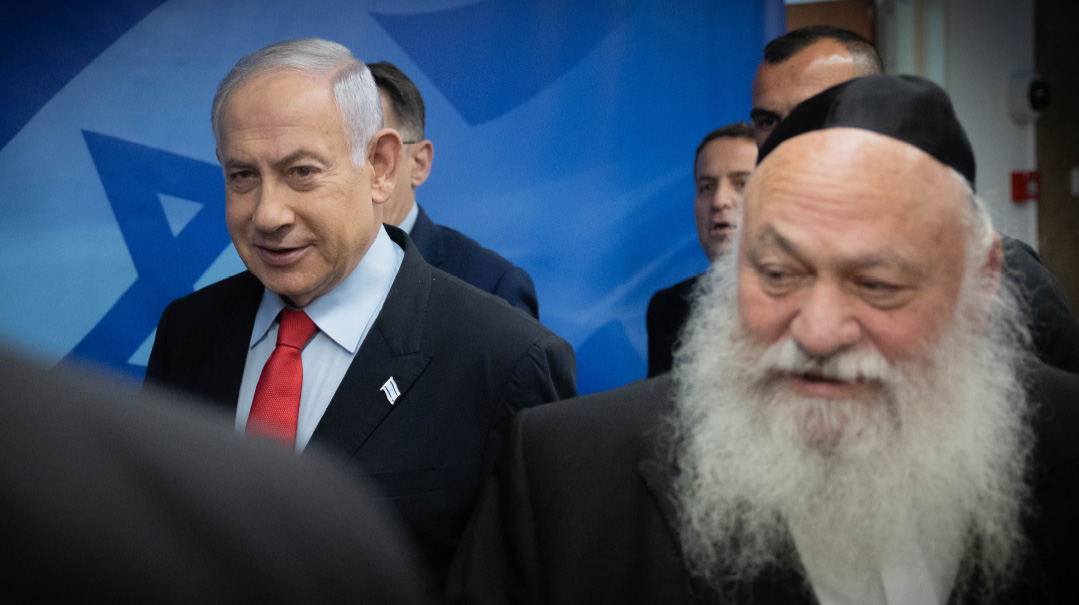Free Gift

A week after breathing the crisp Washington air, Netanyahu has returned to the humid climate of Israeli politics

Photo: AP Images
G
etting flanked from the right by Donald Trump for the second time wasn’t on Binyamin Netanyahu’s radar. More than any coalition kibitzing, Trump’s recent remarks about the hostage deal, including last Motzaei Shabbos, have put Bibi at odds with his right-wing base.
Netanyahu was informed of Trump’s intention to demand the release of all the hostages a day after the release of the previous batch of hostages, whose pale faces and emaciated bodies reminded many of the images of Holocaust Muselmänner.
“His heart is in the right place,” Bibi said about Donald, who reacts from the heart as well as from the head.
Over the following days, Trump couldn’t get past the shocking scene, repeatedly comparing the photos of the released hostages to the images of concentration camp inmates from the 1940s.
Bibi received advance notice of Trump’s ultimatum, but even Bibi “what’s a gift between friends” Netanyahu can receive one gift too many. Taking the political situation week by week, Netanyahu had hoped for an uneventful Shabbos, allowing him to drag out the time to the second phase of the deal.
The restful weekend failed to materialize. After Trump shocked everyone last Monday by suggesting that Israel demand the release of all the hostages by Shabbos, warning for the second time since his election that Hamas would have to pay a devastating price, Netanyahu found himself wriggling to get out of right-wing ministers’ demands to accept Trump’s terms and kill the deal.
Bibi must have gotten sympathy from veteran Shas ministers, who regularly had to parry headlines about Rav Ovadiah Yosef’s Motzaei Shabbos drashah by saying his words had been “taken out of context.” Netanyahu had to explain to cabinet ministers that Trump was referring to the return of all the Phase One hostages by noon on Shabbos, and that the plan to return the second-phase hostages in weekly trickles still stood.
A week after breathing the crisp Washington air, Netanyahu has returned to the humid climate of Israeli politics. Trump’s off-the-cuff comments about blowing up the deal were jumped on by Smotrich and Ben-Gvir as a concrete plan of action. One could say that Israel’s hard right takes the American president’s words more literally than anyone else.
AS FAR AWAY from Washington as it gets, Netanyahu has to return every week to the basement of the Tel Aviv District Court to continue his testimony, which is dragging on longer than the hostage deal.
If Netanyahu felt that it was important to project an image of a “strong Bibi” overseas, he removed the thick layer of makeup in the courtroom, candidly discussing his poor health and the antibiotics that sustained him during his weeklong US visit, accompanied closely by his medical team.
At the opening of his trial, I predicted that Netanyahu would play hooky from his testimony at every opportunity, one more way of thumbing his nose at the judicial system. If you track Bibi’s schedule since then, you can’t help but notice the pattern. One week it was an urgent tour of the Syrian Hermon, another time a visit abroad. But last week he had an extra-strong cocktail of excuses: a combination of poor health, a confidence vote in the Knesset, and a crisis in the hostage deal. At the White House and at the Knesset podium, Netanyahu looked robust. He saves the health card for the court deliberations on Weizmann Street, Tel Aviv.
His return from Washington to bira amikta — not just because the courtroom happens to be underground — has put Netanyahu in a fighting mood. On the agenda are the mounting calls for the formation of a state commission of inquiry into the events of October 7, to be led by incoming High Court president Yitzchak Amit, at whose swearing-in ceremony last week the prime minister, justice minister, Knesset speaker, and other right-wing ministers were notably absent, in protest at an appointment they see as illegitimate.
As a statement of sorts, Attorney General Gali Baharav-Miara made an appearance at the government meeting regarding the commission of inquiry — which the High Court forced Netanyahu to hold — even though she represents the opposing view on the matter.
This time, the fury against the attorney general was shared by the person who appointed her, Foreign Minister Gideon Saar.
“Netanyahu appointed Mandelblit — that doesn’t mean he’s responsible for all his decisions,” Saar told me when I asked if he feels any responsibility for Baharav-Miara’s actions.
Avichai Mandelblit, you may remember, was Netanyahu’s cabinet secretary until Bibi appointed him as attorney general — when he promptly indicted his former boss.
Aside from Saar and Elkin, who agreed to a commission on the condition that Deputy High Court President Noam Sohlberg — a knitted-kippah wearing High Court justice who lives in a settlement — help appoint its members, cabinet members were unanimous in the opinion that forming a commission of inquiry at this time would only benefit the left. As Degel HaTorah chair Moshe Gafni was recorded saying, “Forming a commission of inquiry will bring down the government.”
ANYONE WHO’S HAD occasion to spend a few hours with Netanyahu in Tel Aviv will be familiar with his thoughts about the city skyline. At some point or other, Netanyahu will point at the magnificent towers and ask: “You see those skyscrapers? They were built on my watch and boosted the Israeli economy, yet the people inside them won’t vote for me.”
Netanyahu’s oft-repeated comment received a dark twist at the start of the war, with his apocalyptic vision of the proud skyscrapers being reduced to rubble in the event of war with Hezbollah. Dismissed defense minister Yoav Gallant, who resigned from the Knesset and endured a humiliating debate in the Likud faction last week regarding his removal from the party, has attacked Netanyahu in recent interviews, claiming that his fears led him to falter at a golden opportunity to launch a preemptive strike on Hezbollah in the days following October 7.
There’s nothing new under the sun. Netanyahu has always been seen as a defensive player who never attacks without exhaustive planning. Anyone who knows the man will admit that had the red phone rung in Caesarea rather than Eilat at 2 a.m. that fateful night, the army would have been put on high alert, and “October 7” would never have become a phrase that sends a chill down every Jew’s spine.
The Scoop
Overheard
“The army assessed that we wouldn’t rescue a single hostage,” Netanyahu sniped last week from the Knesset podium at heckling opposition members.
That comment was backed up by none other than Shas chair Aryeh Deri, who just two weeks ago was threatening to topple the government if there isn’t a resolution to the draft issue.
Deri’s backing for Netanyahu, and his attendance at the subsequent cabinet meeting, for the first time since the outbreak of the war, shows that the chareidim still believe in Netanyahu’s ability to get things done in the Israeli Knesset, and not just in the American Congress. Netanyahu’s far-right partners, though, have less faith.
(Originally featured in Mishpacha, Issue 1050)
Oops! We could not locate your form.







